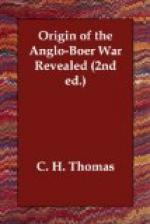Upon the whole, the religious status of the Boers may be fairly compared to that of the old American pilgrim fathers, only much less intolerant, fairly strict sabbatarians, and jealous in maintaining national and individual morality. About forty years ago a small group seceded from the Dutch Reformed Church and formed a separate connection under the name of “Enkel gereformende Kerk” (simply reformed Church), more generally known under the sobriquet of “Doppers.” This cult is identical with the parent Church, and differs only in a somewhat stricter church discipline and the rejection of the hymns from the common psalm and hymn-book upon the ground that many of them are tainted with dangerously anti-scriptural doctrine.[15] These Doppers are really very worthy people, but noted for their strong conservatism and adherence to old habits and customs, even in the matter of dress. President Krueger is one of their prominent members and so is General Piet Cronje.
The devotional habits of the Boers form one of their national characteristics. The family collect at dawn for morning worship, led by the parent or else by the tutor—it consists of a hymn, Scripture-reading, and prayer—similarly before retiring at night, devout grace before and after each meal. These practices are not relaxed when travelling with their wagons or when in the field. On Sundays an extra (forenoon) service is added. Strangers and travellers receiving hospitality are always courteously and unostentatiously admitted to those family devotions. One may thus meet with one or more wagons camped in the wilderness and find a cluster of men, women, and children engaged in happy devotions and singing psalms or hymns in the familiar old “Herrenhut” melodies, or one may come upon a scene where men just returned to camp, begrimed and still perspiring from a day’s hunt or battle, join with husky voices an already assembled group in the customary service.
Such practices of piety cannot fail to have a salutary effect upon the young, nor can it be with justice said that the bulk of the people are inconsistent in their conduct, though formality and insincerity are sadly frequent enough, and in late years a decadence in seriousness and an increase of frivolity instead have marked the present epoch, especially among those who are exposed to the pernicious influences and contaminations incidental to town life. The old Free Stater mentioned before expressed the expectation that the present war and trials will tend to check that declension, and in that way prove to have a compensating character for good. During my frequent travels it had been my privilege as a guest to make the acquaintance of numerous truly Christian Boer families, both well-to-do and poor. On one occasion I had to accept the hospitality at a farmhouse of one named Brits,[16] nicknamed “vuil” or dirty Brits. This was an old blind widower; his household was composed, besides himself, of an old brother, also a widower,




